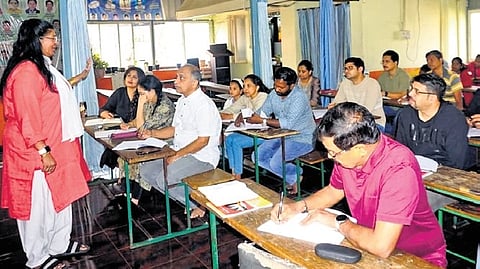

BENGALURU: Language is a bridge between cultures, a mirror reflecting collective history. Karnataka is a diverse, cosmopolitan melting pot of different peoples, with equally different backgrounds, awareness and stories to tell, and Kannada helps carry these colourful tales from the state to places far and wide.
As a torchbearer of Kannada knowledge and preservation in her own unique way, Sushma Shankar has come a long way. For 17 years, she has been transforming lives through her free Kannada classes. What began as a small summer camp has grown into a full-fledged movement for linguistic empowerment, with Sushma aiming to make Kannada accessible and enjoyable for all.
“The reason I started taking Kannada classes is because I saw that even some Kannadigas didn’t know how to read and write Kannada, though it was their mother tongue. Especially in Bengaluru, people often prefer speaking English over Kannada,” Sushma recalls.
What sets Sushma’s classes apart are their inclusive, grassroots approach. Initially, her Kannada teaching efforts were focused on schoolchildren through camps held every May. These camps, completely free, ran for 30 days, and were designed to build foundational literacy and love for the language. But as the word spread, demand grew even among adults.
“Many came to learn at their convenience, and we made changes accordingly,” she explains. “Early morning sessions, weekend classes — we did everything possible to ensure no one was denied learning.” Initially, each camp had 300-400 students.
Building language bridges
This flexible, community-driven model soon gained traction. Sushma’s team started approaching local schools to teach students the state language, and many enrolled. Before long, the team was teaching thousands, young and old, across different regions. Separate classes for adults and children ensured that everyone learned at their own pace in a comfortable setting.
The quality and commitment behind her Kannada education initiative did not go unnoticed. The Karnataka government, in collaboration with a Kerala missionary group, hosted a two-day training camp on ‘How to Teach Kannada’, in which Sushma not only participated, but was also recognised as a certified teacher eligible to teach at ‘Karnataka Kalika Kendras’, which the state government officially endorses. Her summer camps were also bestowed with the status of a ‘Kannada Kalika Kendra’.
Under this framework, her classes today follow a structured format: hour-long sessions, three times a week, totalling 36 hours per course. After completion, students take an exam and receive certificates upon passing.
Sushma’s love for languages extends beyond Kannada. Her academic pursuit in the language took her from clearing the Kannada Pravesha, Jaana and Kava exams, to eventually completing an MA, MPhil, and PhD in Kannada from Dravidian University, Kuppam.
In September 2021, she founded the ‘Dravida Bhasha Translators Association’, with a vision to bridge the literary and cultural heritage of the five Dravidian languages — Kannada, Tamil, Telugu, Malayalam, and Tulu. With over 80 active members, the association preserves, translates and promotes Dravidian languages. Sushma sees this as essential to sustaining the cultural fabric of South India, and she is determined to keep building a stronger ecosystem for regional language translators.
Sushma’s own tryst with Kannada began in her early twenties. Originally a Malayalam speaker, she didn’t know how to read, write or speak Kannada, until she married a man from Mandya. It was her father-in-law who first inspired her to learn Kannada.
Despite several personal and professional hurdles, her love for the language only deepened. Encouraged by mentors like poet and lyricist Padma Shri Doddarangegowda, and supported by her family, Sushma continued to persevere. From being a passionate learner to becoming a teacher, she has inspired thousands to believe that learning Kannada, or any language, is not a rigid path, but one filled with joy, patience, and purpose. Her classes are more than lessons; they are spaces for people to overcome the belief that it is difficult to imbibe new languages.